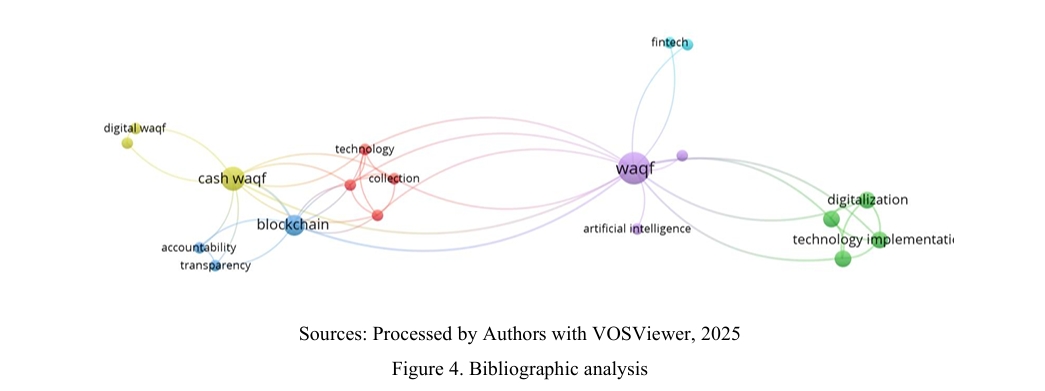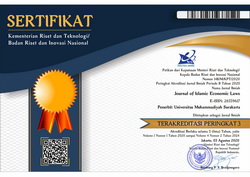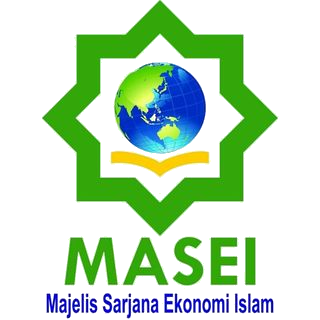Implementation of Advanced Technology in Waqf Management: A Systematic Literature Review
DOI:
https://doi.org/10.23917/jisel.v8i01.8518Keywords:
Technology, Waqf Management, Economic Welfare, Systematic Literature ReviewAbstract
This systematic literature review explores the implementation of advanced technology in waqf management by mapping and classifying key research themes and trends. Utilizing the PRISMA protocol, an initial search across Scopus, OpenAlex, Crossref, and Google Scholar identified 1,289 articles. These were then screened for relevance based on inclusion and exclusion criteria, resulting in 17 articles selected for in-depth analysis. The thematic mapping reveals four dominant clusters: (1) blockchain technology, which is frequently discussed for its potential to enhance transparency and accountability in waqf transactions; (2) cash waqf and digital waqf, highlighting innovations in fundraising and asset management; (3) artificial intelligence and fintech, which are explored for improving risk assessment, fund allocation, and operational efficiency; and (4) digital platforms, which are recognized for expanding accessibility, facilitating public participation, and streamlining waqf processes. The review also identifies significant challenges, including regulatory gaps, limited technological infrastructure, and stakeholder resistance to change. At the same time, best practices from countries such as Malaysia, Singapore, and Oman illustrate successful technology adoption in waqf management. By systematically mapping these themes, this study provides a comprehensive overview of the research landscape, offers practical insights for policymakers and practitioners, and highlights the need for further empirical research to measure the real-world impact of technology implementation in diverse waqf contexts.
Downloads
References
Abdulquadri, A. O., & Quadri, Y. O. (2025). Zakat and Waqf: Developmental Role of Modern Approaches to Islamic Philanthropy and Endowments. In International Journal of Sukuk and Waqf Research (Vol. 6, Issue 1, pp. 1–11). Sukuk and Waqf Society, USA. https://doi.org/10.46281/ijswr.v6i1.2268
Ahmadi, A. Z., Afifah, A. M., Qarar, W., & Atiqi, H. (2024). Understanding Islamic Economics as an Islamic Moral Economy. COMSERVA : Jurnal Penelitian Dan Pengabdian Masyarakat, 4(5), 1080–1088. https://doi.org/10.59141/COMSERVA.V4I5.2172
Akhter, S., Ahmad, M. R., Chibb, M., Zai, A. F., & Yaqoob, M. (2024). Artificial intelligence in the 21st Century: Opportunities, Risks and Ethical Imperatives. Educational Administration: Theory and Practice. https://doi.org/10.53555/KUEY.V30I5.3125
Alam, M. M., Shahriar, S. M., Said, J., & Monzur-E-Elahi, M. (2018). Waqf as a Tool for Rendering Social Welfare Services in the Social Entrepreneurship Context. Global Journal Al-Thaqafah, 2018, 87–98. https://doi.org/10.7187/GJATSI2018-06
Almomani, M. A.-A., AbuAlhoul, M. A., Alqudah, M. T. S., & Al-Khalidi, I. K. S. (2024). Exploring Digital Waqf Management: Opportunities and Challenges. International Journal of Religion, 5(12), 20–30. https://doi.org/10.61707/AX7VD794
Anas, A., Syakirunni’am, L., Sadali, A., Surur, A. T., & Adinugraha, H. H. (2024). Welfare in Islamic Economics Perspective: Literature Review. Affective Development Journal, 1(1), 21–32. https://doi.org/10.32585/AFFECTIVE.V1I1.24
Ascarya, A., Hosen, M. N., & Rahmawati, S. (2022). Designing simple productive waqf models for Indonesia. International Journal of Ethics and Systems, 38(3), 380–401. https://doi.org/10.1108/IJOES-07-2020-0101
Asra, A., & Savitri, A. (2023). Optimization of Productive Waqf for Improving Community Economic Welfare. Jurnal Akuntansi Muhammadiyah, 13(2), 35–45. https://doi.org/10.37598/JAM.V13I2.1895
Awalluddin, M. A., Maznorbalia, A. S., & Arshad, M. R. (2024). Revolutionizing Waqf Management: Harnessing the Fourth Industrial Revolution for Waqf 4.0 Transformation. International Journal of Research and Innovation in Social Science, VIII, 2270–2283. https://doi.org/10.47772/ijriss.2024.8080171
Aysan, A. F., & Al-Saudi, H. A. (2023). Blockchain technology and the potential of waqf (Islamic endowment) sector revival. Journal of AI, Robotics & Workplace Automation, 2(4), 317–326. https://ideas.repec.org/a/aza/airwa0/y2023v2i4p317-326.html
Bakar, M. A., Ahmad, S., Salleh, A. D., & Salleh, M. F. M. (2020). The Implementation of Good Governance in Sustaining Waqf Fund: An Experience of Indonesian Waqf Board (BWI). Advanced International Journal of Banking, Accounting and Finance (AIJBAF), 2(2), 46–65. https://gaexcellence.com/aijbaf/article/view/937
Belahouaoui, R., & Attak, E. H. (2024). Digital taxation, artificial intelligence and Tax Administration 3.0: improving tax compliance behavior – a systematic literature review using textometry (2016–2023). Accounting Research Journal, 37(2), 172–191. https://doi.org/10.1108/ARJ-12-2023-0372
Blau, P. M. (2017). Exchange and power in social life. Taylor and Francis. https://doi.org/10.4324/9780203792643/EXCHANGE-POWER-SOCIAL-LIFE-PETER-BLAU
Bonang, D., Ismail, S., & Sukmana, R. (2024). Empowering The Future of Cash Waqf Through Digitalisation: An Insight Into The Philanthropic Intention of The Indonesian Muslim Community. ISRA International Journal of Islamic Finance, 16(S1), 94–117. https://doi.org/10.55188/ijif.v16iS1.586
Entezari, A., Aslani, A., Zahedi, R., & Noorollahi, Y. (2023). Artificial intelligence and machine learning in energy systems: A bibliographic perspective. Energy Strategy Reviews, 45, 101017. https://doi.org/10.1016/J.ESR.2022.101017
Fachrurrazy, M., Siliwadi, D. N., & Herlina, N. (2022). Potential for Digital-Based Productive Waqf Development (Case Study of Datuk Sulaiman ModernIslamic Boarding School and Muhammadiyah Boarding School) in Palopo City, South of Celebes. AL-FALAH : Journal of Islamic Economics, 7(1), 141. https://doi.org/10.29240/alfalah.v7i1.3840
Fikriyah, K., & Alam, W. Y. (2021). Perkembangan Keuangan Syariah dalam Realitas Politik di Indonesia. Jurnal Ilmiah Ekonomi Islam, 7(3), 1594–1601. https://doi.org/10.29040/JIEI.V7I3.2687
Haneef, M. A., Pramanik, A. H., Mohammed, M. O., Bin Amin, M. F., & Muhammad, A. D. (2015). Integration of waqf-Islamic microfinance model for poverty reduction: The case of Bangladesh. International Journal of Islamic and Middle Eastern Finance and Management, 8(2), 246–270. https://doi.org/10.1108/IMEFM-03-2014-0029/FULL/XML
Hasbulah, M. H., Shuib, M. S., Asni, F., Ahmad, K. A., Hashom, H., Mustafa, W. A., & Syamsuri. (2024). Implementation of Technology in Cash Waqf: A Structured Literature Review. Journal of Advanced Research in Applied Sciences and Engineering Technology, 89–103. https://doi.org/10.37934/araset.54.2.89103
Hatimah, H., Sukoharsono, E. G., Djamhuri, A., & Adib, N. (2024). Exploring Waqf Management Transformation: Opportunities and Challenges (case study in Ismuhu Yahya Foundation Pontianak). Journal of Ecohumanism, 3(8), 58–68. https://doi.org/10.62754/joe.v3i8.4712
Herindar, E., & Rusydiana, A. S. (2022). The Measuring Efficiency of Waqf Fund. Al-Awqaf: Jurnal Wakaf Dan Ekonomi Islam, 14(2), 107–122. https://doi.org/10.47411/AL-AWQAF.VOL14ISS2.149
Ibrahim, D., Ibrahim, H., & Masron, T. A. (2021). Waqf efficiency and its transformative technology in improving the waqf system in Malaysia. In Artificial Intelligence and Islamic Finance. Routledge. https://doi.org/10.4324/9781003171638-3
Ismail, W. M. W. (2020). Significance of Technology to Cash Waqf Collection: Application of Unified Theory Acceptance and Use of Technology (UTAUT). International Journal of Academic Research in Business and Social Sciences, 11(1). https://doi.org/10.6007/ijarbss/v11-i1/8994
Janom, N., Izham, M. Z., Mansor, F. S., Aris, S. R. S., Bashah, N. S. K., & Arshad, N. H. (2019). Review on success factors of waqf information management system in Malaysia. Indonesian Journal of Electrical Engineering and Computer Science, 16(1), 412–419. https://doi.org/10.11591/IJEECS.V16.I1.PP412-419
Kalkavan, H., Dinçer, H., & Yüksel, S. (2021). Analysis of Islamic moral principles for sustainable economic development in developing society. International Journal of Islamic and Middle Eastern Finance and Management, 14(5), 982–999. https://doi.org/10.1108/IMEFM-07-2019-0271/FULL/XML
Kosmon, B., Ibrahim, S. S., Sharip, S. M., Rahman, A. A., & Abidin. Nurul Fadly. (2023). Potential Blockchain Applications in Waqf for Sustainability: A Middle East and Asia Perspective. Islamiyyat, 45(2), 47–64. https://doi.org/10.17576/islamiyyat-2023-4502-04
Latifah, N. A., & Jamal, M. (2019). Analisis Pelaksanaan Wakaf di Kuwait. ZISWAF : Jurnal Zakat Dan Wakaf, 6(1), 1–18. https://doi.org/10.21043/ZISWAF.V1I1.5607
Mohaiyadin, N. M. H., Aman, A., Palil, M. R., & Said, S. M. (2022). Addressing Accountability and Transparency Challenges in Waqf Management Using Blockchain Technology. Journal of Islamic Monetary Economics and Finance, 8(Special Issue), 53–80. https://doi.org/10.21098/JIMF.V8I0.1413
Napitupulu, R., Sukmana, R., Ali, S., Ahmad, H., & Padangsidimpuan, A. (2023). A Review of Fintech and Waqf Intersections in Academic Debates. ZISWAF: Jurnal Zakat Dan Wakaf, 10(1), 44–64.
Nazir, P., Studi, W. :, Wakaf, M., Di, P., Wakaf, L., & Munawar, W. (2021). Profesionalitas Nazir Wakaf: Studi Manajemen Wakaf Produktif di Lembaga Wakaf Daarut Tauhiid. Journal of Islamic Economics and Finance Studies, 2(1), 17–33. https://doi.org/10.47700/JIEFES.V2I1.2731
Ningsih, F. M., Gilar Yulianto, J., Muarrifah, S., Islam, U., Saifuddin, N. K. H., & Purwokerto, Z. (2023). Accountability and Transparency of Wakf in the Management of Social Funds and Empowerment of the People. Munazzama: Journal of Islamic Management and Pilgrimage, 3(2), 109–122. https://doi.org/10.21580/MZ.V3I2.18582
Nugroho, A. J., Doktoralina, L., & Ali, C. M. (2023). Contemporary Issues of Waqf in Indonesia. BILTURK. The Journal of Economics and Related Studies, 5(3), 187–198. https://doi.org/10.47103/bilturk.1260151
Nurfattah, A., & Bachtiar, R. (2023). Optimizing Waqf Management For Social Impact. Islamic Business and Management Journal, 6(2), 120–131. https://doi.org/10.21111/IBMJ.V6I2.11376
Pakpahan, Z. A., Abstrak, K. K., Kajian, S., & Serentak, S. P. (2019). Pelaksanaan Pemilihan Umum Serentak Pada Pemilihan Presiden Dan Wakil Presiden, Anggota DPR, Anggota DPD, Dan Anggota DPRD Sebagai Implementasi Pelaksanaan Sistem Demokrasi Pancasila (Suatu Kajian Terhadap Format Sistem Pemilu Indonesia Ke Depan Yang Tepa. Jurnal Sosial Ekonomi Dan Humaniora, 5(2), 161–185.
Purbasari, H., Dwi, A., Bawono, B., Handika, R., & Triyono, T. (2023). Bibliometric Waqf Management in Indonesia. Riset Akuntansi Dan Keuangan Indonesia, 8(2), 195–201. https://doi.org/10.23917/REAKSI.V8I2.3054
Putri, F. I. (2022). Performance of Waqf Fund Efficiency Managed by Zakat Institutions in Indonesia. International Journal of Waqf, 2(1). https://doi.org/10.58968/IJF.V2I1.149
Qurrata, V. A., Yusida, E., Hussain, N. E., Merlinda, S., Purnamasari, V., & Seprillina, L. (2021). Effectiveness of Cash Waqf Management in Improving Community Welfare: Challenges and Opportunities. Review of Integrative Business and Economics Research, 10(1), 342–359.
Ramdani, R., Tri Ratnasari, R., & Mawardi, I. (2022). Management And Strategy In Waqf Institution: A Systematic Literature Review. Perisai : Islamic Banking and Finance Journal, 6(2), 135–145. https://doi.org/10.21070/PERISAI.V6I2.1614
Rohim, A. N., Priyatno, P. D., & Sari, L. P. (2022). Transformation of Waqf Management in The Digital Era: A Meta Synthesis Study. AL-FALAH : Journal of Islamic Economics, 7(2), 209. https://doi.org/10.29240/alfalah.v7i2.5421
Sakina, W., Sanusi, A., Fairuz, M., Salleh, M., & Yaacob, S. E. (2023). The Management and Implementation of Zurri Waqf in Malaysian Waqf Instituition (Pengurusan dan Pelaksanaan Wakaf Zurri dalam Institusi Wakaf Malaysia). Jurnal Pengurusan, 67, 43–54. https://doi.org/10.17576/pengurusan-2022-67-04
Sudirman, & Ramadhita. (2020). Kesadaran Hukum Masyarakat dalam Akselerasi Sertifikasi Tanah Wakaf di Kota Malang. De Jure: Jurnal Hukum Dan Syar’iah, 12(1), 35–50. https://doi.org/10.18860/J-FSH.V12I1.9087
Supanto, F. (2019). Manajemen Strategi Organisasi Publik Dan Privat. Empatdua Media Intrans Publishing.
Syaifullah, H., & Idrus, A. (2019). Inovasi Pelayanan Wakaf Produktif Era Digital: Studi Kasus Di Yayasan Wakaf Bani Umar 2018. ZISWAF : Jurnal Zakat Dan Wakaf, 6(2), 114. https://doi.org/10.21043/ZISWAF.V6I2.6415
Ulfa, N. N., & Mustafa, M. I. (2023). Finding Solutions for Productive Waqf Management in Indonesia. Fara’id and Wealth Management, 3(2), 1–12. http://journals.smartinsight.id/index.php/FWM
Wan Ismail, W. M., & Abdul Rasool, M. S. Bin. (2021). Roles of Technology Usage in Cash Waqf Contribution: Factors to Enhance Collection of Cash Waqf in Malaysia. International Journal of Academic Research in Business and Social Sciences, 11(8). https://doi.org/10.6007/ijarbss/v11-i8/10803
Wildana, M. D. A., & Imamia, T. L. (2022). Waqf in the 21st Century: The Implementation of Blockchain and Smart Contract Technology. Journal of International Conference Proceedings, 5(1). https://doi.org/10.32535/jicp.v5i1.1774
Zulkarnaen, D., Mukhlisin, M., & Eko Pramono, S. (2021). Can Blockchain Technology Improve Accountability and Transparency of Cash Waqf in Indonesia? Journal of Economic Impact, 3(3), 158–166. https://doi.org/10.52223/jei3032105

Submitted
Accepted
Published
How to Cite
Issue
Section
License
Copyright (c) 2024 Journal of Islamic Economic Laws

This work is licensed under a Creative Commons Attribution-ShareAlike 4.0 International License.



















